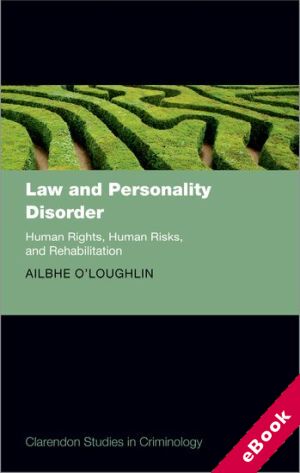
The device(s) you use to access the eBook content must be authorized with an Adobe ID before you download the product otherwise it will fail to register correctly.
For further information see https://www.wildy.com/ebook-formats
Once the order is confirmed an automated e-mail will be sent to you to allow you to download the eBook.
All eBooks are supplied firm sale and cannot be returned. If you believe there is a fault with your eBook then contact us on ebooks@wildy.com and we will help in resolving the issue. This does not affect your statutory rights.
In 1999, policymakers in England and Wales advanced controversial proposals for the preventive detention of a group they termed 'dangerous people with severe personality disorders'. Against a background of uncertain scientific knowledge, legal and policy actors have long faced challenges in reconciling the need to prevent crime with the need to respect the rights of the 'dangerous'. Ailbhe O'Loughlin's book, Law and Personality Disorder, situates contemporary debates about 'dangerous' offenders within this decades-old battle between the proponents of liberal legal principles and advocates of social defence.
Law and Personality Disorder deconstructs competing images of offenders with personality disorders and the dilemmas they present, combining insights from criminology, psychiatry, psychology, and law. The book thus critically engages with an alluring narrative: the state has a duty to protect the public from 'dangerous' individuals, but it can also protect the human rights of the 'dangerous' by providing them with rehabilitation opportunities. While human rights law is often invoked as a means of curbing the excesses of preventive justice, O'Loughlin demonstrates that the case law of the European Court of Human Rights tends to legitimise coercive measures. Criminal law, furthermore, enables the punishment of offenders with mental disorders by resisting psychiatric evidence that they may not be fully responsible for their actions.
Examining gaps in sentencing law, mental health law, and human rights law, this innovative book offers readers a comprehensive interpretation of the laws governing offenders with personality disorders and puts forward proposals for reform.